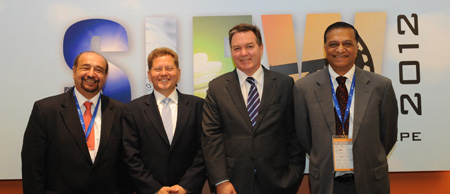
(Picture Credit: EMA)
The discovery of new sources of natural gas in African countries and the United States has led to a belief in Asia that going forward, gas will be a much cheaper source of energy than oil.
But rising regional demand for gas, liquefaction and transportation costs, and the need for producers to recoup their infrastructure investments are proving this belief wrong, concluded three panelists at a roundtable on the future of liquefied natural gas (LNG) in Asia.
Said Dr Fereidun Fesharaki, the Chairman of energy consulting firm Facts Global Energy: "If you want cheap gas, there is no gas. There will always be a minimum price that you have to live with."
Dr Fesharaki was speaking at the roundtable organised by the Energy Studies Institute at the National University of Singapore, as part of the Singapore International Energy Week.
As its population expands and urbanisation ramps up, Asia's energy consumption is rising from its current 40 percent of global energy output. Countries are seeking more natural gas, which has traditionally come from Indonesia, Malaysia and Australia. But these suppliers are also facing increasing domestic demand and tapering production levels. Shale gas in the US and emerging supply from Africa have thus led to buyers wondering if these new sources of supply could also result in cheaper prices.
In the US, for instance, gas prices are determined by the fundamentals of supply and demand at a distribution point known as Henry Hub. The US government expects Henry Hub gas prices to average at less than US$5 per million BTU going forward, while in Asia, prices have run to US$15 per million BTU.
Peter Cleary, Vice-President of Strategy and Corporate Development for Australian oil-and-gas major Santos, noted that the oil-linked price of gas in Asia has given suppliers in the region the confidence to invest in LNG projects. Henry Hub prices, he said, could not reflect the cost of gas in Asia, because "when you add the cost of transportation and liquefaction…it will become more expensive."
While Dr Fesharaki acknowledged the availability of as-of-yet uncontracted gas supplies--such as a 5.2-million tonne per annum project in Angola, which had originally been targeted for the US--he said these would not affect near- to medium-term prices. The bulk of gas contracts for Asia till 2035 have already been fixed to oil-index linked prices.
"And we know that Asians don't renegotiate," he quipped.
The third speaker, the director of Global Energy Strategies LLC, James Slutz, highlighted the extensive basins of shale gas in the US, adding that while there was uncertainty over government approval for LNG exports, "economics" would resolve the issue. There was clear recognition also of the importance of shale gas development to the national economy and jobs, said Slutz, a former US State Department energy official.
"The opportunity is not huge, but as volumes get unshackled and increase, there will be potential for substantial trade," said Dr Fesharaki.
By :EMA staff